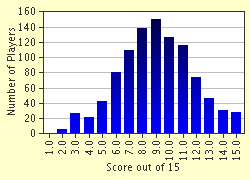Quiz Answer Key and Fun Facts
1. Which of the following is NOT a part of the integumentary system?
2. What are the two types of sweat glands?
3. What are the muscles that cause the hair to raise when stimulated?
4. The motility, elasticity, and texture of the skin is called what?
5. Which of these is a fluid-filled lesion larger than 1 cm that is thin-walled and ruptures easily?
6. Which of these is an abnormal growth of hair, particularly in areas where there is usually very little hair?
7. The field of medical practice involving the integumentary system is called _________?
8. What is the outer layer of the skin?
9. Which of the following is NOT contained in the dermis?
10. Which secondary skin lesion consists of a thickened, dried area from broken pustules or vesicles?
11. Which of the following is NOT caused by malfunctioning of the integumentary system?
12. Which is NOT a cutaneous sense?
13. What is the opaque, white, cresent-shaped area at the base of the nail called?
14. What is the medical term for freckles?
15. What is the resting phase of hair growth?
Source: Author
Morrigan716
This quiz was reviewed by FunTrivia editor
crisw before going online.
Any errors found in FunTrivia content are routinely corrected through our feedback system.


